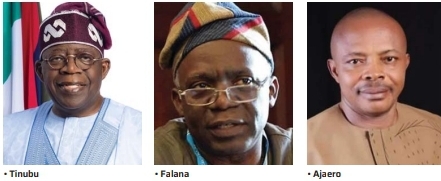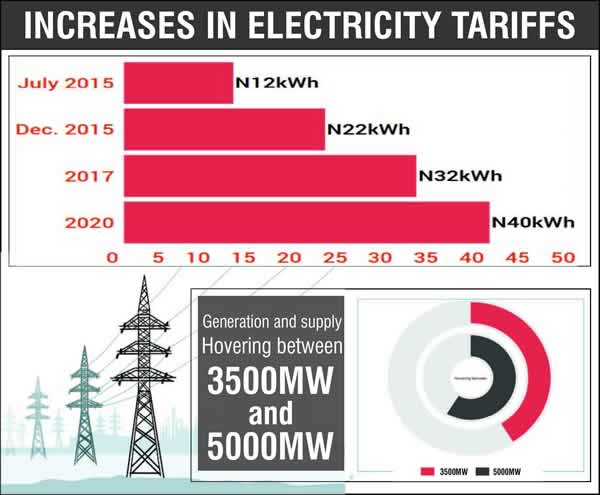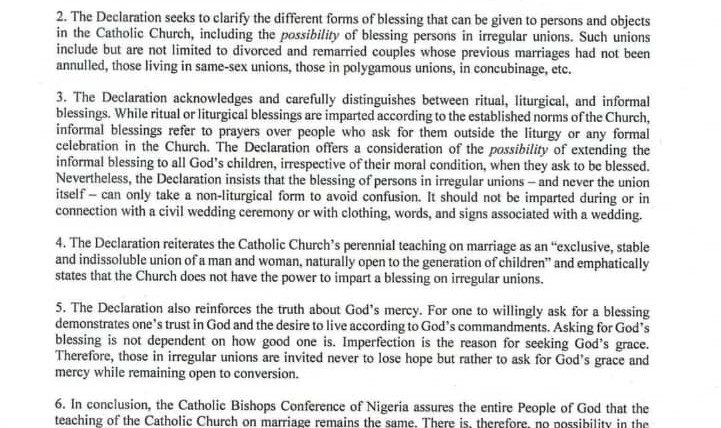- Activist, NLC, stakeholders say it’s ill-timed, unjustifiable, insensitive
- NERC maintains silence, July 1 take-off unimplemented
Intense apprehension in the country over the planned 40 per cent electricity tariff hike, some persons claimed, may have unsettled the Nigerian Electricity Regulatory Commission (NERC). The commission not only jettisoned its take-off scheduled for July 1, 2023 but has maintained unexplained silence creating an air of uncertainty. Despite this silence considered by some citizens as NERC’s hidden plot to quietly increase the tariff, the proposed 40 per cent electricity tariff hike has continued to meet stiff opposition, with many Nigerians and stakeholders criticising the timing, describing the planned increment as callous, insensitive and unjust to the country’s citizens and businesses. Mr. Femi Falana, a Senior Advocate of Nigeria (SAN) and human rights activist at the forefront of the opposition, urged Nigerians to resist the plan by the Federal Government to impose a 40 percent hike in electricity tariff, reportedly to start on July 1.

Speaking with the media, it was insensitive and callous for the Federal Government to even think of increasing tariff on electricity after what Nigerians are going through, following the removal of subsidy on petrol by President Bola Ahmed Tinubu. The human rights lawyer said: “Nigerians should resist economic policies that are designed to further inflict economic pains on them. With respect to the proposed electricity tariff, it is insensitive, it is almost wicked. Nigerians are yet to absorb the pains of the removal of the so-called fuel subsidy and the government is planning to increase the electricity tariff, Nigeria is planning to devalue the currency for an import-oriented economy.
“The economic crisis that will be unleashed on the country through the dollarisation of the economy via the devaluation of the currency is high. So for me, we must take all these problems holistically. “Removal of fuel subsidy, increase in electricity tariff, proposes an increase in school fees, proposes an increase in the price of diesel with the adoption of 7.5 percent VAT and so on; and unless we take a holistic analysis of all these, we may not be able to appreciate what Nigerians are meant to go through, meanwhile no government official at the stage of local government, state level and at the federal level is prepared to make any sacrifices. “When you go around, you still see public officials with fleets of cars like twenty, twenty-five or even up to thirty cars following them; we cannot run a system like that. No public official has said he/she is not going to receive security votes in order to cut governance cost; unless people in power are ready to make sacrifices, the masses won’t take them seriously,” he said.

Speaking with the media, it was insensitive and callous for the Federal Government to even think of increasing tariff on electricity after what Nigerians are going through, following the removal of subsidy on petrol by President Bola Ahmed Tinubu. The human rights lawyer said: “Nigerians should resist economic policies that are designed to further inflict economic pains on them. With respect to the proposed electricity tariff, it is insensitive, it is almost wicked. Nigerians are yet to absorb the pains of the removal of the so-called fuel subsidy and the government is planning to increase the electricity tariff, Nigeria is planning to devalue the currency for an import-oriented economy.
“The economic crisis that will be unleashed on the country through the dollarisation of the economy via the devaluation of the currency is high. So for me, we must take all these problems holistically. “Removal of fuel subsidy, increase in electricity tariff, proposes an increase in school fees, proposes an increase in the price of diesel with the adoption of 7.5 percent VAT and so on; and unless we take a holistic analysis of all these, we may not be able to appreciate what Nigerians are meant to go through, meanwhile no government official at the stage of local government, state level and at the federal level is prepared to make any sacrifices. “When you go around, you still see public officials with fleets of cars like twenty, twenty-five or even up to thirty cars following them; we cannot run a system like that. No public official has said he/she is not going to receive security votes in order to cut governance cost; unless people in power are ready to make sacrifices, the masses won’t take them seriously,” he said.

The NLC President, Joe Ajaero, noted that though details reveal a movement in inflation from 16.9 per cent to 22.41 per cent (threatening to needle at 30 per cent), and a shift in the exchange rate from N441 to N750 (per dollar), but these figures are not a justification for this reckless proposed tariff increase. Mr. Ajaero berated the service providers in the power sector for performing far below expectations, as he also accused power distributors of hiking tariffs stealthily. He stated further, “The service providers in spite of sundry support have not been able to meet the threshold of 5,000 megawatts. Coupled with this, there have been surreptitious increases without notice in violation of statutes. “The inherent risk in the new regime of tariff is that there is no control, implying that by August, consumers will pay new rates.
The other risk is that by the time other products or service-rendering entities come up with their new prices or rates, the ordinary person would have been compacted into dust. “We would want to advise the apostles of the market who have called the NLC all sorts of names to check their conscience. The rate at which they are going is highly combative and combustible.” Mr. Dominic Igwebuike, acting General Secretary of the National Union of Electricity Employees, made bold the union’s plan to resist any move by Discos or the NERC to hike tariffs.
He said, “We are just yelling over the more than 100 per cent increase in petrol price, now they are talking about a 40 per cent increase in electricity tariffs. Can you imagine that? And this is about the sixth time they are increasing it since the sector was privatised. “The NUEE condemns it in totality. It is unacceptable and it shows that the government does not care about the feelings of the poor masses. They are not talking about increasing generation capacity but raising tariffs. It is very sad,” he said. They called for measures to be put in place to mitigate the impact on the country’s citizens and businesses.
Also, the Coalition of Northern Groups (CNG), expressed similar concerns, noting that any increase in utility costs would be detrimental to the majority of the population. Suleiman Abdul-Azeez, the spokesman of CNG, said: “If there must be any form of adjustment in electricity tariff, there must as well be commensurate provisions for first, adequate and sufficient supply of the commodity.” According to Solomon Aderoju, Chairman of the Lagos State chapter of the Nigerian Association of Small and Medium Enterprises, increase in electricity tariff would spike production costs and consequently exacerbate the plight of the MSMEs. He said, “It is going to cause problems in the MSME environment because it is going to increase the cost of production. We are facing very tough times now because of what is happening with petrol and diesel. “Even the exchange rate is gargantuan now.
This electricity tariff hike is going to lead to an increase in the cost of production and already, our cost of production is too much to bear. Unfortunately, the cost of borrowing is also high. The MPR (monetary policy rate) is now 18.5 per cent. No MSME can thrive under these circumstances. The rate of inflation is 22.41 as of today. MSMEs are facing very turbulent times now. Similarly, Mr. Gabriel Idahosa, Deputy President of the Lagos Chamber of Commerce and Industry, posited that the proposed hike would negatively impact the productive sector of the economy. Idahosa said, “How can they do that? Industries are already coping with so many dimensions of inflation in costs. This will be another heavy layer on them. It is going to be a serious burden to the issues that businesses are already facing.”
Mr. Segun Kuti-George, the National Vice President of the Nigerian Association of Small-Scale Industrialists, condemned the proposed hike. He, however, stated that if the hike is accompanied by increased supply that would drive down the reliance on alternative energy sources for production needs, the productive sector of the economy would be better for it. Over the weekend, reports also claimed that the planned electricity tariff hike may have been suspended. However, NERC is yet to declare its position on the 40 percent increase in electricity tariff amid widespread criticism.



